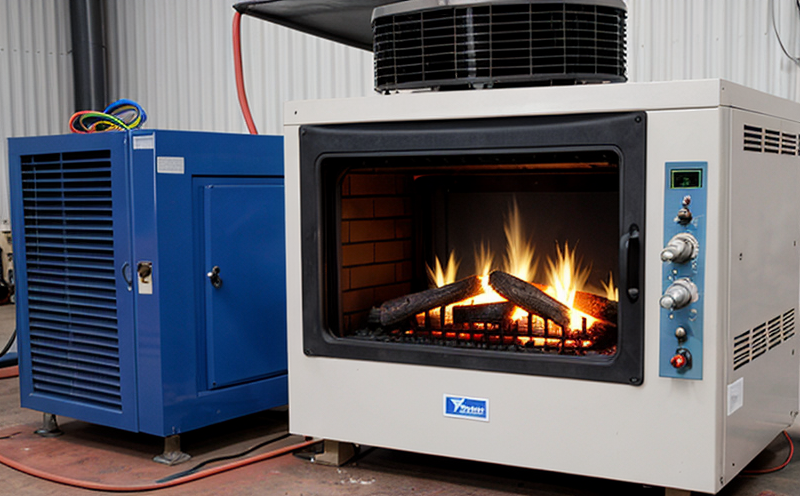IEC 60068 2 1 Cold Thermal Testing for Lighting Products
The Lighting Testing sector encompasses a variety of critical tests aimed at ensuring the durability, safety, and performance of lighting products under diverse environmental conditions. One such essential test is the cold thermal testing specified in IEC 60068-2-1.
The IEC 60068-2-1 standard deals with the application of low temperature environments to determine the resistance and performance capability of products. This particular section focuses on cold conditions, which is crucial for lighting products that are subjected to harsh climates or extreme temperature variations during their lifecycle.
Lighting products such as LED lamps, fluorescent tubes, and other luminaires may be exposed to sub-zero temperatures in various real-world applications. The purpose of this test is to ensure these products can withstand cold conditions without compromising on performance, safety, or longevity.
The testing procedure involves subjecting the lighting product to a specified temperature range for a predetermined duration. The specimen must not only survive but also maintain its functionality and integrity throughout the test. This process helps in identifying potential weaknesses in design or manufacturing that could lead to failure under cold conditions.
When conducting this test, it is essential to follow international standards accurately. For instance, IEC 60068-2-1 specifies the temperature range of -25°C to +25°C and the duration of exposure which can vary depending on the product category. The apparatus used for such testing includes cold chambers or environmental test chambers capable of maintaining precise temperature control.
Proper specimen preparation is critical before initiating the test. This involves ensuring that the product is representative of its intended use, free from any defects, and in a state similar to how it would be shipped to customers. It's also important to note that certain components within the lighting fixture might have different thermal characteristics; these need careful attention during testing.
The results of this test are crucial for quality assurance teams as they provide insights into the product’s ability to operate safely and effectively in cold environments. Compliance with IEC 60068-2-1 ensures that manufacturers meet regulatory requirements while also building consumer trust by demonstrating robustness against challenging conditions.
Understanding the impact of cold temperatures on lighting products can help in optimizing design choices, material selection, and manufacturing processes to enhance overall product reliability. By incorporating IEC 60068-2-1 into development cycles early on, manufacturers can save time and resources by addressing potential issues before they become costly problems during production or post-sale support.
For quality managers looking to ensure compliance with industry standards, R&D engineers aiming to improve product performance, and procurement teams seeking reliable suppliers—IEC 60068-2-1 cold thermal testing offers invaluable data that contributes significantly towards achieving these goals.
At Eurolab, we pride ourselves on delivering comprehensive and accurate IEC 60068-2-1 cold thermal testing services for lighting products. Our state-of-the-art facilities and experienced technicians ensure that every test meets the highest industry standards.
- State-of-the-Art Facilities: We house advanced environmental chambers capable of simulating various climatic conditions, including extreme cold temperatures required by IEC 60068-2-1.
- Experienced Technicians: Our team comprises highly skilled professionals who understand both the theoretical aspects and practical applications of these tests.
- Accurate Reporting: Each test comes with detailed reports that not only document the results but also provide recommendations for improvement if necessary.
- Compliance Assurance: By adhering strictly to international standards like IEC 60068-2-1, we guarantee that our clients receive compliant products ready for market entry or export.
Choosing Eurolab means partnering with experts who take pride in delivering exceptional service tailored specifically to your unique needs. With us, you can rest assured knowing that your lighting products will undergo thorough cold thermal testing ensuring they meet stringent quality and reliability benchmarks.
Quality and Reliability Assurance
- Consistent Temperature Control: Our environmental chambers maintain precise temperature control within ±0.5°C, ensuring consistent results across multiple tests.
- Repeatability and Reproducibility: We ensure that our testing processes are repeatable and reproducible, providing confidence in the accuracy of test outcomes.
- Data Integrity: Our systems automatically log all parameters during testing, ensuring data integrity and traceability throughout every step of the process.
These quality assurance measures are crucial for maintaining high standards across all our services. By adhering to these principles, we provide clients with reliable results that can be trusted as a basis for decision-making regarding product design, manufacturing processes, and regulatory compliance.
Use Cases and Application Examples
| Product Category | Potential Use Case | Application Example |
|---|---|---|
| LED Lamps | Outdoor installations in cold regions. | Street lighting for cities located in Northern Europe during winter months. |
| Fluorescent Tubes | Industrial environments with wide temperature fluctuations. | Factories operating in remote areas where heating systems are limited or unavailable. |
| Luminaires | Exterior applications requiring long-term outdoor exposure. | Architectural lighting fixtures for landmarks situated near polar regions. |
The above table illustrates how IEC 60068-2-1 cold thermal testing is applicable to various products and their respective use cases. By subjecting these lighting products to controlled cold environments, manufacturers can identify potential issues early on in the development stage, thereby enhancing product performance and reliability.





